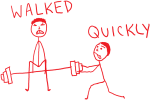If you’ve been following my blog beyond my agent analysis series, you know I’m fixing my novel after I wrote it. It’s like I’m learning to drive and hitting all the possible cones on the way.
What you may not know is that I also write a series about learning to write. It’s something that no one in the world though about doing it, ever: Blogging about the book he or she is writing. Yes, I’m the first.
I already addressed show vs tell which illustrates how little I knew about writing. But telling has many facets, and this post is about the next level in telling. Advanced telling, if I may.
Don’t tell me what to do
Let’s start with preempting the action. This happens when instead of actually executing the action, you first tell the reader about it before actually doing it.
I’m going to explain it for you. It’ll start with an example, some self-deprecating humor, followed by quirk remarks until the punch line. Finally, we’ll move to the next point.
For example, take this excerpt from an awful author who should remain nameless:
“You don’t remember your last name. Hmm,” she says without looking at me. “Do you remember where you live, or any of your friends? Do you know where you work?”
I decide to tell the truth.“No, I don’t remember anything,” I tell her the truth. Actually, the truth is that I’m a potential mass murderer, and I have no idea why and how I ended up here, or even how to do the actual mass murdering. But if I said that out loud she’d probably think less of me.
Note that the text in red is completely unnecessary. We don’t have to announce what characters are going to do, or what’s going to happen. Things can just happen and the reader will pick it up. She or he is not stupid.
Now, you may think I’m some kind of a genius to have figured this out. But you’ll be surprised to know that I had a lot of those in my first drafts, and one of the best beta readers I ever had was kind enough to point out those mistakes. In fact, as like most things regarding my ad hoc writing education, feedback from quality beta readers and editors is what hopefully will make my own book good enough to be enjoyed.
Overexplaining
Preemptive explanation was part of an overall weakness of my manuscript where I tend to over explain things.
Another manifestation of this problem was with its opposite, postemptive. I wish postemptive was a word: Reactive doesn’t seem to apply here. You see, pre means before and post means after, so postemptive would be after the action, but not necessarily reacting to the action. Do I make myself clear?
Okay, back to explain overexplaining.
Here’s an example from the same unpublished-author-who-should-not-be-named:
Hermes clearly didn’t expect me to do that; he falls flat on the floor of this paradoxically soothing white room. To be honest, I didn’t expect me to do that, either. A burst of pain rushes along my knuckles but it was worth it. Iris is at my side, smiling, but she moves away from me after that,
guessing what I was going to do next if she stayed close.
Again, the text marked in red is unnecessary. Iris moved away after seeing a violent scene, so obviously anyone can guess that she didn’t want the same fate to happen to her. We don’t have to explain it. Again, readers are not dumb (unless they don’t like my book – kidding!)
Like Music to My Ears
One of the problems of learning about writing is that it may spoil some stories for you. When I talked about this to a friend, he compared it with music: Mistakes that can make musicians cringe are often unnoticed by untrained ears.
![gty_jimi_hendrix_playing_tongue_guitar_bw_thg_121120_wblog[1]](https://chracatoa.files.wordpress.com/2017/07/gty_jimi_hendrix_playing_tongue_guitar_bw_thg_121120_wblog1.jpg?w=810)
That was basically me when I was only a reader. Now that I’m training my ears, it affected my favorite hobby: reading. The latest book I’m reading is filled with preemptive action and over explaining, making the characters flat and the story somewhat boring. Since the premise is interesting, I keep jumping ahead to go back to action and learn what’s going to happen.
Still, I like to think that I wouldn’t have enjoyed the book anyway even when if I didn’t understand its problems. Before, I’d just dislike it for no reason. Now, the reason is right in from of me, and it makes me cringe.
Final Thoughts
Preemptive action and over explaining are not what I want to read in a book. It’s not that I don’t want the book to have telling, since telling is also important and has its place. But the fact is that in many cases doing the action is better than explaining it.
And the obvious reason is that if you’d show it, you wouldn’t need to tell me.
Thanks to my lovely daughter for the stick figure drawing. The sentence the agent is saying is actually based on a real page from the TSA website:

And yes, the agent does seem too happy to be doing this kind of work.
Here are my favorite posts about my ongoing backwards journey to learn how to write after I finished my still unagented Science Fiction novel.
 The Redeemability Scale - Can a non-villain main character go too far and become unredeemable? Where is the line, and why is it drinking decaf? The transgressions are:
Quirks, Small Vices, Lying, Violence, Infidelity, Misdemeanors, Betrayal, Torture, Murder, Mind Control, Hurting Animals, Genocide, Sexism and Misogyny, Bigotry, Slavery, and others.
The Redeemability Scale - Can a non-villain main character go too far and become unredeemable? Where is the line, and why is it drinking decaf? The transgressions are:
Quirks, Small Vices, Lying, Violence, Infidelity, Misdemeanors, Betrayal, Torture, Murder, Mind Control, Hurting Animals, Genocide, Sexism and Misogyny, Bigotry, Slavery, and others. Writing a Book is Much More Than Just Writing a Book -
Writing a Book is Much More Than Just Writing a Book - The stages of writing.
 More Than Words - Show vs. Tell: Overexplaining and hand-holding are not the words I want to hear from you.
More Than Words - Show vs. Tell: Overexplaining and hand-holding are not the words I want to hear from you. Don’t tell; show me the glint of light of my burning novel. - Show, don't tell is the number one rule of writing. Seriously, how often you do stuff without knowing the number one rule of it?
Don’t tell; show me the glint of light of my burning novel. - Show, don't tell is the number one rule of writing. Seriously, how often you do stuff without knowing the number one rule of it? Everyone’s a Critic - When classic novels get harsh reviews, and even fake writers are chastised, your book will definitely have more than its share of criticism. Or to be more formal, haters gonna hate.
Everyone’s a Critic - When classic novels get harsh reviews, and even fake writers are chastised, your book will definitely have more than its share of criticism. Or to be more formal, haters gonna hate. Believability is Overrated - Despite the fact they distract readers, and sometimes break the suspension of disbelief, novels with blatant problems may still become best sellers.
Believability is Overrated - Despite the fact they distract readers, and sometimes break the suspension of disbelief, novels with blatant problems may still become best sellers. Verb, do you even lift? - Adverbs, the next twist on my ongoing backwards journey to learn to write after I wrote my adult science fiction book.
Verb, do you even lift? - Adverbs, the next twist on my ongoing backwards journey to learn to write after I wrote my adult science fiction book. Emotional Cheat Sheet - This emotional cheat sheet is based on the wheel chart, but it's longer, with no misspells or duplicates, and in an easier-to-read format.
Emotional Cheat Sheet - This emotional cheat sheet is based on the wheel chart, but it's longer, with no misspells or duplicates, and in an easier-to-read format. He thought; therefore, he was. - Writing can be tense and personal - or how I accidentally wrote a book in first person and present tense.
He thought; therefore, he was. - Writing can be tense and personal - or how I accidentally wrote a book in first person and present tense.
Disclaimer: I’m not a writer, I have a hard time paying attention to detail, I overuse adverbs, I start a lot of sentences with ‘I’, and I often confuse words that are similar. More importantly, I reserve the right to change my mind at any time, in which case I’ll deny I ever wrote it. Please let me know if you find something that is too embarrassing. This blog is riddled with typos and creative grammar problems, but it’s mine. Luckily, I can always blame my mistakes on the fact that English is not my first language. Or hackers.
 Messengers of the Gods is a commercial science fiction novel with series potential at 100k words. This book is not yet published and I’m actively looking for agents. More info here.
Messengers of the Gods is a commercial science fiction novel with series potential at 100k words. This book is not yet published and I’m actively looking for agents. More info here.
Prospective agents and publishers: My manuscript is complete and unagented at the moment. If you’re interested, please contact C. Hofsetz at chracatoa at hofsetz.com (replace ‘at’ with @ and remove spaces).

5 comments